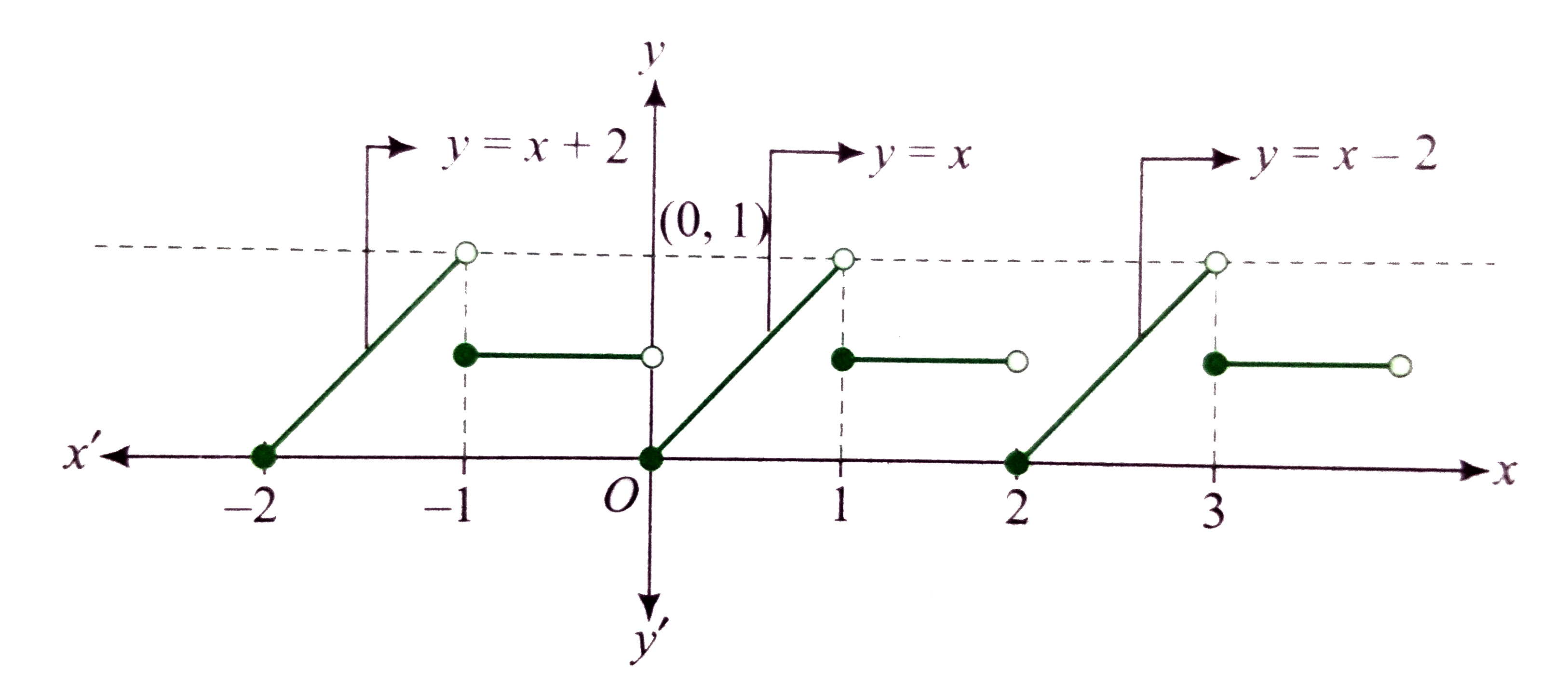Which of the following function is/are periodic? (a)f(x)={1,ξsrational0,ξsirrational (b)f(x)={x−[x];2n<x<2n+112;2n+1≤x<2n+2 where [.] denotes the greatest integer function, n∈Z f(x)=(−1)[2xπ], where [.] denotes the greatest integer function. f(x)=x−[x+3]+tan(πx2), where [.] denotes the greatest integer function, and a is a rational number
f(x)={1,x is rational0,x is irrational
f(x)={x−[x],2n≤x<2n+112,2n+1≤x<2n+2
where [.] denotes the greatest integer function n∈Z
f(x)=(−1)[2xπ], where [.] denotes the greatest integer function
f(x)=x−[x+3]+tan(πx2), where [.] denotes the greatest integer function, and a is a rational number
The correct Answer is:A, B, C, D
f(x)={1,x is rational0,x is irrational
orf(x+k)={1,x+k is rational0,x+k is irrational, where k is any rational number
={1,x is rational0,x is irrational
=f(x)
Therefore, f(x) is periodic function, but its fundamental period cannot be determined. Thus,
f(x)={x−[x],2n≤x<2n+11/2,2n+1≤x<2n+2
Draw the graph from which it can be verified that period is 2.

f(x)=(−1)[2xπ]
orf(x+π)=(−1)[2(π+x)π]=(−1)[2xπ]+2=(−1)[2xπ]
Hence, the period is π.
f(x)=x−[x+3]+tan(πx2)={x}−3+tan(πx2)
{x} is periodic with period 1,tan(πx2)x is period with period 2.
Now, the LCM of 1 and 2 is 2. Hence, the period of f(x) is 2.
Topper's Solved these Questions
- RELATIONS AND FUNCTIONSBOOK - CENGAGE ENGLISHCHAPTER - RELATIONS AND FUNCTIONSEXERCISE - Linked Comprehension Type
32 Videos
- RELATIONS AND FUNCTIONSBOOK - CENGAGE ENGLISHCHAPTER - RELATIONS AND FUNCTIONSEXERCISE - Matrix Match Type
9 Videos
- RELATIONS AND FUNCTIONSBOOK - CENGAGE ENGLISHCHAPTER - RELATIONS AND FUNCTIONSEXERCISE - Single Correct Answer Type
125 Videos
- PROPERTIES AND SOLUTIONS OF TRIANGLEBOOK - CENGAGE ENGLISHCHAPTER - PROPERTIES AND SOLUTIONS OF TRIANGLEEXERCISE - Archives (Numerical Value Type)
3 Videos
- SCALER TRIPLE PRODUCTS BOOK - CENGAGE ENGLISHCHAPTER - SCALER TRIPLE PRODUCTS EXERCISE - DPP 2.3
11 Videos
Similar Questions
Discuss the continuity of the following function : f(x)={1,ifξsrational0,ifξsirrational
View SolutionFind the value of x where f(x)={x,ifξsrational1−x,ifξsirrationaliscont∈uous.
View SolutionIf the functions f(x)andg(x) are defined on R→R such that f(x)={0,x∈rationalx,x∈irrational andg(x)={O,x∈irrationalx,x∈rational then (f−g)(x)is (a)one-one and onto (b)neither one-one nor onto (c)one-one but not onto (d)onto but not one-one
View SolutionColumn I: Function, Column II: Type of function f(x)={sgnx)sgn};x≠0,n is an odd integer, p. odd function f(x)=xex−1+x2+1 , q. even function f(x)={0,ifξsrational1,ifξsirrational , r. neither odd nor even function. f(x)=max{tanx,cotx} , s. periodic
View SolutionDifferentiate the following functions w.r.t. x.
f(x)=√x2+1
View SolutionIf f(x)={x,ξsrational1−x,ξsirrational,thenf(f(x)) is x∀x∈R (b) {x,ξsirrational1−x,ξsrational {x,ξsrational1−x,ξsirrational (d) none of these
View SolutionIf f(x)=3x2+ax+a+1x2+x−2, then which of the following can be correct (lim)x→1f(x)eξstsa=−2 (lim)x→−2f(x)eξstsa=13 (lim)x→1f(x)=43 (lim)x→−2f(x)=−13
View SolutionWhich of the following function is surjective but not injective.
(a) f:R→R,f(x)=x4+2x3−x2+1
(b) f:R→R,f(x)=x2+x+1
(c) f:R→R+,f(x)=√x2+1
(d) f:R→R,f(x)=x3+2x2−x+1
View SolutionIf f(x) is periodic function with period, T, then
View SolutionDifferentiate the following functions w.r.t x using first principle.
f(x)=e2x
View Solution
